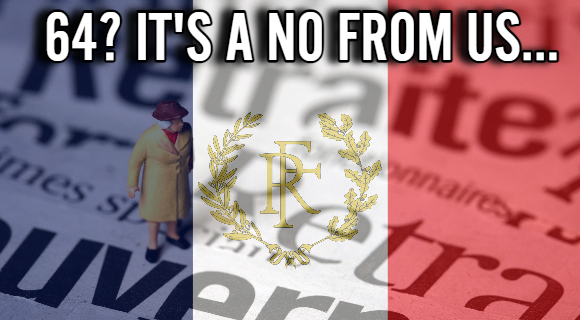from 21st Century Wire:
 The Macron government’s attempt to force Article 49:3 of the French constitution in order to impose his pension reform bill onto the parliament and the citizenry is backfiring and could throw France into unnecessary chaos.
The Macron government’s attempt to force Article 49:3 of the French constitution in order to impose his pension reform bill onto the parliament and the citizenry is backfiring and could throw France into unnecessary chaos.
Is this the end of Macron’s reign, and what does a motion of censure means for France? Here’s a quick recap of where France stands after the horrid announcement of the invocation of constitutional Article 49:3 – which could throw France into total chaos…
TRUTH LIVES on at https://sgtreport.tv/
Was it overconfidence, or because the parliament refused the vote on the “Pension Reform Bill” proposed by Macron’s government? The decision to use Article 49, paragraph 3 of the Constitution to adopt the bill without a vote – has triggered the exasperated opposition, both left and right, to move forward with the decision to propose motions of censure.
An agreement between the different political parties would leave no escape route for Macron’s government if the motion to censure was to be agreed upon by the majority on Monday when it’s expected to be voted.
The crisis is real!
Yesterday in the French Parliament, Prime Minister Elisabeth Borne was met with an “a cappella” French national anthem coming from the opposition benches, as she announced she will once more be using Macron’s favorite “legislative weapon” – Article 49, paragraph 3 of the French Constitution – to force one of Macron’s most unpopular bills on pension reform, pushed by an EU undercurrent, forcing the French citizenry to work an extra 2 years until the age of 64 before being able to retire.
Over the last past weeks, large protests in the French capital and across the country were hugely under-reported by our mass media, with numbers of attendees undermined by the government and their MSM mouthpiece, a glaring sign of discontent Macron arrogantly chose to ignore. By invoking 49:3, he didn’t fail to galvanise the inter-union, and here’s how the next few days will unfold…
As it is customary when imposing a 49:3, opposition members have 24 hours to file their motion of censure which is taking place today before 15:30. The actual vote will take place on Monday 20th March, and a verdict is to be expected on the very same day.
For those unfamiliar with the French motion of censure, it is the primary means available to a parliament to show its disapproval of government policy and force it to resign. In other words: to show its distrust of the government in place.
The motion must receive the votes of the absolute majority of the members of the National Assembly – currently 287 – to be effective. In this case, the bill would be canceled and Macron’s government would be forced to resign.
A trans-partisan motion of censure is being filed as we speak, and if indeed it were to be adopted by the majority, the French government would fall. The last time such a motion was adopted in France was in 1962.
Should the motion to censure be successful, Macron would have three options to choose from:
1. He could renew his confidence in Elisabeth Borne and choose to appoint her again
2. Form another government, or
3. Dissolve the National Assembly.
Should Monday’s motion to censure be unsuccessful, there is also the option to appeal the 49:3 via the Constitutional Council.
In the event the government manages to survive, it will likely do so by carrying on with Macron’s mandate with no authority whatsoever.
But more crucially, if the motion fails it’s more than likely we will see the radicalisation of the protest in the streets, as the unions and the people are not prepared to let Macron force his bills onto the people of France.
Another possibility the “communist” and the “left” have looked into is to approach the Constitutional Council to demand a referendum of shared initiative (RIP) to counter the reform prior to the 2027 election, a move that would allow the people of France to decide for themselves. The option of the shared initiative referendum has several stages.
It is first necessary to bring together 185 parliamentarians to table a bill, something the opposition already has.
Upon a possible validation from the Elders of the Council, the RIP initiative would have to be “supported by a tenth of the voters”, i.e. 4.87 million people in France, whose signatures must be collected within nine months. It is therefore a complex procedure that has never been completed since its introduction.
The Constitutional Council will then have to ensure that the text does not concern a subject already rejected by referendum – which is not the case for this pension reform right now – nor that the law is… already enacted.
The window of opportunity is therefore very short.
Currently the “Rassemblement National” of Marine le Pen (RN), Les Insoumis, the Communists, and ‘The Libertés, Indépendants, Outre-mer & Territoires ( LIOT) party, already have their motion ready to be filed.
Interestingly, the LIOT group is ranked in the center and therefore is more likely to be supported on both the left and the right of the hemicycle, therefore if the entire left bloc and the RN were to vote for this motion, Jean-Luc Mélenchon would withdraw the Nupes motion “in favor of that of LIOT” to “give the greatest possible chances to censorship”.
Read More @ 21stCenturyWire.com



